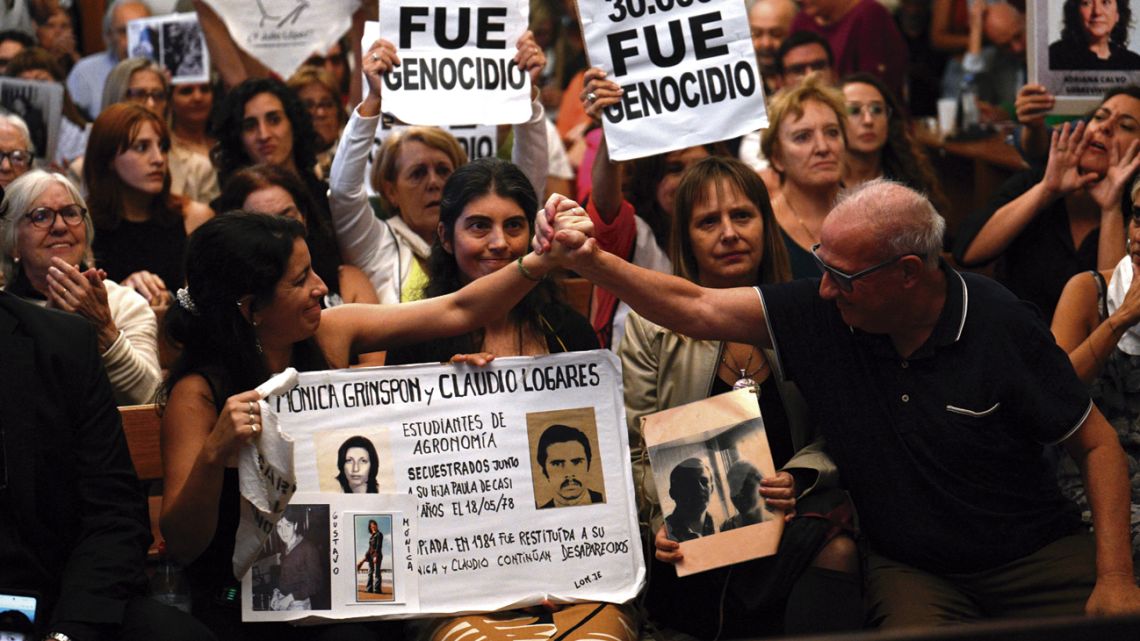One of Argentina’s largest and longest prosecutions for crimes against humanity carried out during the 1976-1983 military dictatorship has ended with 10 ex-repressors sentenced to life imprisonment.
Oral Federal Court No. 1 in La Plata on Tuesday issued the punishments after completion of a trial over 400 cases at three clandestine centres in Buenos Aires Province.
Along with 10 lifetime sentences, one defendant was sentenced to 25 years, while another was acquitted. Six others have died in the three years since the trial began – including Miguel Etchecolatz, one of the main targets of the trial, who passed away in 2022 at age 93.
During the trial, which began in in 2020 and lasted more than three years, charges of abduction, forced disappearances, homicide, torture, rape, baby-snatching, forced abortions and other crimes were considered proven by the testimony of witnesses and survivors according to the La Plata federal court conducting the trial. The court ordered “urgent” medical tests to resolve whether the house arrest enjoyed by most of those convicted should be revoked so that they serve their sentences in prison.
The convictions were announced just two days after a new anniversary of the coup of March 24, 1976 was marked and recalled with marches nationwide and a massive rally in Plaza de Mayo under the slogan “Memory, truth and justice.”
Holes of hell
The so-called ‘Los Pozos’ trial exposes some of the crimes committed at three clandestine detention centres, known as Pozo de Banfield, Pozo de Quilmes and Brigada de Lanús. The latter was dubbed ‘Hell’ due to the atrocities committed there against those suffering political persecution.
All three sites were supervised by Etchecolatz, the dreaded former Buenos Aires provincial police deputy chief who died in prison less than two years ago while serving nine life sentences.
The defendants, who all claimed their innocence, include detention officers, police officers, police and military doctors and a former provincial minister.
The individuals sentenced to life imprisonment were Federico Antonio Minicucci, Guillermo Matheu, Carlos Romero Pavón, Roberto Balmaceda, Gustavo Fontana, Jaime Lamont Smart, Jorge Héctor Di Pasquale, Juan Miguel Wolk, Horacio Luis Castillo and police doctor Jorge Antonio Bergés.
Former police officer Alberto Julio Candiotti was given 25 years and fellow-policeman Augusto Barré acquitted.
Trial and punishment
The cases in question involved more than 400 victims who were held at three of Argentina’s hundreds of infamous “clandestine detention centres.”
Among the victims in the cases were 23 pregnant women held at the detention centres. Some were forced to undergo unwanted abortions, some were disappeared, and some babies born to the detained women were taken and given to families friendly to the regime, with most only discovering their own true identities years later.
The Abuelas de Plaza de Mayo, the organisation seeking their grandchildren born in captivity to their mothers, were a plaintiff in the case, along with seven grandchildren who have recovered their identities. The work of the Abuelas has permitted 133 grandchildren to recover their identity out of the 400 who, the organisation estimates, were appropriated during the captivity of their mothers.
“I’m happy, we’re undergoing a difficult moment in the country regarding truth and memory and this is a big push to continue demonstrating that there was a genocide with 30,000 missing and that we still need to find 300 more brothers and sisters,” said 45-year-old María Victoria Moyano Artigas, who was born in Pozo de Banfield during her mother’s time in captivity.
Another plaintiff, Pablo Díaz, is a survivor of the so-called ‘Night of the Pencils’ in September 1976,when the dictatorship abducted 10 adolescent schoolchildren for advocating a low-cost student bus ticket.
It is 47 years since he said goodbye to his fellow student activists. Six remain missing, with no military authority having revealed their final fate.
“Trial, punishment and sentence has arrived for all those implicated in the killing, torturing and raping in Pozo de Banfield,” a moved Díaz told AFP.
All of the accused, except for Di Pasquale – who is in the Campo de Mayo military prison – were held under house arrest during the trial. All heard the verdict via a remote connection and were reprehended on numerous occasions by the court for turning off their cameras while their sentences were being read out over the course of five hours.
‘Murderers,’ ‘genocide’
The courtroom was full of relatives of the victims and survivors testifying in the case. The sentences were celebrated with emotional shouts of “Common prison for the genocides, murderers, murderers!”
Some people carried posters with photographs of the victims and captions calling for justice.
“They were 30,000, it was genocide,” proclaimed one poster, referring to the estimated number of victims left by the dictatorship according to human rights organisations.
The verdicts come as the dictatorship era is once again at the forefront of national political debate.
President Javier Milei has characterised the ’70s as an era of “war” between authorities and left-wing guerillas, albeit with “excesses,” rather than a “dictatorship.”
Since the resumption in 2006 of trials for crimes committed under the dictatorship – after a period of amnesty in the 1990s – more than 1,180 people have been convicted in 317 trials. Around 660 prisoners are currently in detention, and 62 proceedings remain in progress, according to judicial data.
